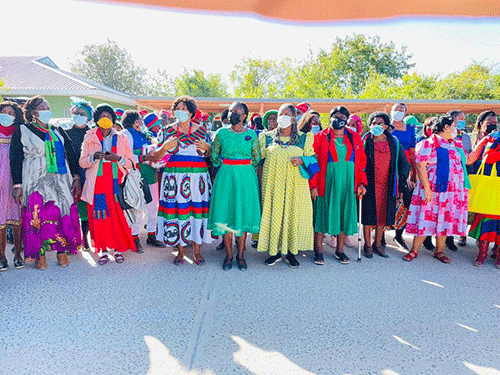The Swapo Party Women’s Council will embark on projects intended to sustain orphans and destitute people in regions and wants to involve other stakeholders to facilitate projects.
This follows challenges encountered while the SPWC carried out the ongoing SPWC regional leadership orientation programmes, which started in April this year.
The orientation programme is spearheaded by recently-elected secretary Fransina Kahungu, who indicated they have observed a need to expand assistance to orphans and vulnerable persons in Swakopmund.
“In Nkurenkuru, a need to provide an opportunity to women to do gardening activities was observed. In Karasburg, the artistic talents of women, which are not uplifted fully to bear economic fruits, are a concern,” she explained.
She said the SPWC plans to acquire tracts of land in various areas, where women will take part in urban and rural agricultural activities.
“In Outapi, the increasing rate of teenage pregnancy was notable at the Outapi State Hospital and has alerted us to the need to influence policy interventions that are aimed at curbing teenage pregnancy. In the Okashakati village in the Okongo area, for example, we have identified a need to drill a borehole as a step towards the provision of clean water for the people in the community. Water is a crucial need,” she said.
She added the leadership also committed to the provision of electricity to the Otjomatemba community, which merely has the electricity poles but no provision of electricity to individual households.
“SPWC is to facilitate opportunities for women to fully take part in political, social, economic, cultural and religious activities. SPWC will make funds available for drilling boreholes, provision of electricity, agricultural projects, land delivery for many purposes and housing delivery,” she said.
The council’s new leaders indicated they committed themselves to contribute to the payment of tuition fees for learners and students.
Another decision made during the orientation programme was for the SPWC, together with other stakeholders, to influence policy interventions that are aimed at curbing teenage pregnancy and educating young people on the danger of early pregnancy.
SPWC will drive the campaign of nationhood, including taking part in civic affairs to become a member of a political party.
Kahungu said the leadership has embarked on a programme to host orientations for its rank and file, which simultaneously facilitate platforms to visit and engage the regions through empowering them with knowledge and skills to carry out their mandate.
Furthermore, it presented an invaluable opportunity to gain insight into the challenges facing the cadres in the regions.
“Through these programmes, we were able to remind ourselves of the burden of leadership that rests on the shoulders of those trusted to lead the masses – Swapo being a mass-based movement,” she said.
– ljason@nepc.com.na.na


